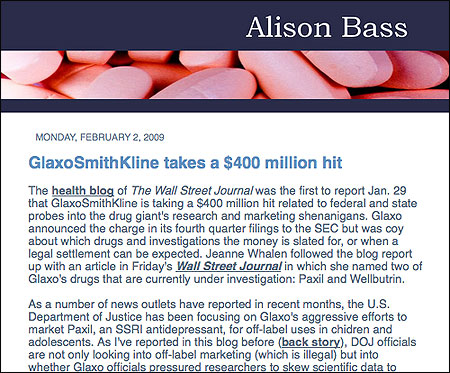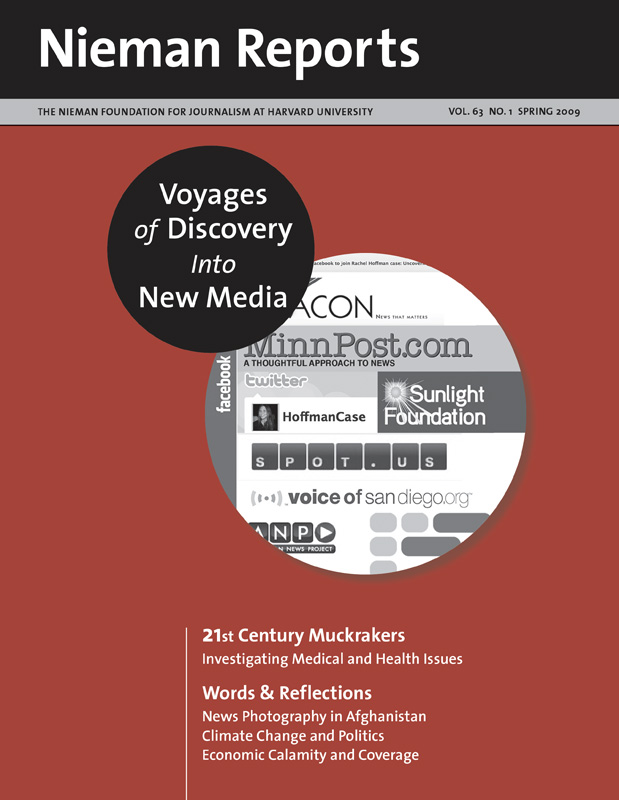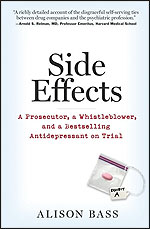One afternoon, when I was a reporter for The Boston Globe, a cryptic message found its way to my desk. A woman who called the paper had left her phone number and a message having to do with the misappropriation of funds from the state mental health agency. As the paper’s mental health reporter, I received the tip.
It was late in the day and, having just filed a daily story, I almost didn’t return the call. But I did, and a person identifying herself as Donna answered. She sounded wary at first but warmed as we chatted; she knew my byline and told me she liked reporting I’d done on recent cutbacks in services for the mentally ill. She let me know that she was the assistant administrator of research for Brown University’s department of psychiatry and had in her possession documents proving that her boss, the chief of psychiatry at Brown, was collecting hundreds of thousands of dollars from the Massachusetts Department of Mental Health for research that apparently wasn’t being done.
In September, "Side Effects" was announced as one of the four recipients of the National Association of Science Writers' 2009 Science in Society Journalism Awards.
Read the Press Release.And Donna Howard had other allegations to share with me that day. She also suspected that researchers in Brown’s psychiatry department were misrepresenting data for two clinical drug trials, including one study on Paxil for treating depression in adolescents. As we spoke that day, I remember typing quick notes with my phone cradled to one ear and thinking to myself that this can’t be true. She agreed to meet with me the next day at a Burger King halfway between Providence, Rhode Island, where she worked, and Boston.
Everything she told me that morning was backed up by extensive documentation and confirmed in interviews with other sources. During the next several months, I wrote a series of front-page articles for the Globe about research and billing transgressions by Brown’s chief of psychiatry.
More than a decade later, Algonquin published my nonfiction book, “Side Effects: A Prosecutor, a Whistleblower, and a Bestselling Antidepressant on Trial,” which tells the story of two women (Howard being one of them) who exposed the deception behind the making of the blockbuster drug, Paxil. My book lays bare the longstanding complicity between prominent academic psychiatrists and the pharmaceutical industry and reveals disturbing flaws in the way drugs are tested and marketed.

Blogs and Investigative Reporting
“Side Effects” could not have been written without the investigative reporting I did for The Boston Globe, which brings me to a major point of this essay: The best muckraking of recent decades has been done by reporters who worked for metropolitan dailies with the resources to support their reconnaissance. Other news outlets, including public radio and broadcast and cable television, rarely do their own skunk work and, with a few exceptions, piggyback instead on stories that newspapers unearth.
Now, however, such investigative verve has largely disappeared from newsrooms around the country because financially strapped newspapers no longer have the capacity to fund this kind of intense, beat-driven work—outside the political arena, at least.1 At regional newspapers like the Globe, health and science reporters are, for the most part, too busy filing dailies, posting online updates, and trying to avoid layoffs to take the time needed to meet with kooky-sounding anonymous sources at Burger King.
RELATED ARTICLE
"Defining an Online Mission: Local Investigative Reporting"
- Andrew Donohue and Scott LewisSome optimistic media observers say the crucial watchdog role of newspapers is being subsumed by blogs, and there are certainly a few blogs that have made a splash in the investigative arena. I’m thinking here of Talking Points Memo, Pharmalot, and Smoking Gun as well as some local news blogs like voiceofsandiego.org and the New Haven Independent. I also write a blog, alison-bass.blogspot.com, where I report and comment on health care issues. As a long-time journalist, doing this keeps me abreast of important developments in health care, and I get to think aloud about the ramifications of these developments. And my blog has led to invitations for me to write opinion pieces for bigger news outlets. On a number of occasions, my blog—and other independent ones such as Health Care Renewal and Furious Seasons—have inspired others to investigate and write about scientific malfeasance. Indeed, I find independent-minded blogs often work best in tandem with the mainstream media, which take their findings and amplify them for a larger audience.
There are, however, a variety of constraints on bloggers’ ability to do investigative reporting. As a freelance journalist who pays my bills by teaching journalism at Mount Holyoke College, I have neither the time nor the resources to do the kind of digging I was encouraged to do at the Globe. In writing my book, for example, I filed several FOIA requests with the federal Food and Drug Administration (FDA) to retrieve public information about the way that agency worked with the pharmaceutical industry in vetting new drugs. The FDA—under the secrecy-obsessed Bush administration—responded by demanding that I pay hundreds of dollars in upfront copying fees before they would fulfill my requests, money I didn’t have. Fortunately, I obtained most of the information I needed from other sources who had requested similar documents over the years and had deeper pockets than I.
RELATED ARTICLE
"Investigating the Pharmaceutical Industry on a Blog"
- Ed SilvermanBottom line is that it takes time and money to do the kind of muckraking that newspapers have always excelled at, and I’m not sure the blogosphere can reliably reproduce this all-important function. In one particularly worrisome sign, the best and most reliable blog about the pharmaceutical industry—Pharmalot, a blog that regularly broke investigative news—went out of business on January 5th because its indefatigable pharmaceutical industry reporter, Ed Silverman, took a buyout from the financially strapped Star-Ledger in Newark, New Jersey. Had the Star-Ledger truly valued the blog’s investigative mission, it could have hired another reporter to continue what had become an internationally respected brand. Instead, this blog’s dissolution leaves a big gap in the independent coverage of the pharmaceutical industry, one that other news-oriented blogs, such as the health blog of The Wall Street Journal, do little to fill. Pharmalot’s demise augers ill for the future of investigative-minded blogs.
Watchdogs on Capitol Hill
It is interesting to note that in one corner of the health care arena, a small team of government investigators has taken up some of the watchdog slack. During the past year, aides for Senator Charles Grassley, a ranking member of the Senate Finance Committee, have uncovered extensive financial ties between prominent doctors and the pharmaceutical and medical device industries. Their findings—that some doctors repeatedly failed to disclose the millions of dollars they were being paid to promote industry products—have appeared in newspaper stories and in blogs around the country. As a direct result of these probes, the National Institutes of Health has finally begun enforcing its own conflict of interest policy, and a number of universities, including Harvard Medical School, have said that they will stiffen or at least review their conflicts of interest policies for faculty researchers.
Such government investigations, however, are inevitably short-lived. Grassley’s team is conducting these probes for the express purpose of bringing attention to the problem with the hope of crafting—and passing—legislation that would require the public disclosure of such conflicts. As has been proven throughout our history, our democracy cannot depend solely upon government to root out malfeasance, especially since wrongdoing sometimes involves government officials. This job, like it or not, has fallen to the press and, until America’s newspapers invent a new business model to replace the dwindling revenue from print advertising and cover the cost of aggressive reporting, this critical mission remains in peril.
Alison Bass is the author of “Side Effects: A Prosecutor, a Whistleblower, and a Bestselling Antidepressant on Trial,” published by Algonquin Books in June 2008.
It was late in the day and, having just filed a daily story, I almost didn’t return the call. But I did, and a person identifying herself as Donna answered. She sounded wary at first but warmed as we chatted; she knew my byline and told me she liked reporting I’d done on recent cutbacks in services for the mentally ill. She let me know that she was the assistant administrator of research for Brown University’s department of psychiatry and had in her possession documents proving that her boss, the chief of psychiatry at Brown, was collecting hundreds of thousands of dollars from the Massachusetts Department of Mental Health for research that apparently wasn’t being done.
In September, "Side Effects" was announced as one of the four recipients of the National Association of Science Writers' 2009 Science in Society Journalism Awards.
Read the Press Release.And Donna Howard had other allegations to share with me that day. She also suspected that researchers in Brown’s psychiatry department were misrepresenting data for two clinical drug trials, including one study on Paxil for treating depression in adolescents. As we spoke that day, I remember typing quick notes with my phone cradled to one ear and thinking to myself that this can’t be true. She agreed to meet with me the next day at a Burger King halfway between Providence, Rhode Island, where she worked, and Boston.
Everything she told me that morning was backed up by extensive documentation and confirmed in interviews with other sources. During the next several months, I wrote a series of front-page articles for the Globe about research and billing transgressions by Brown’s chief of psychiatry.
More than a decade later, Algonquin published my nonfiction book, “Side Effects: A Prosecutor, a Whistleblower, and a Bestselling Antidepressant on Trial,” which tells the story of two women (Howard being one of them) who exposed the deception behind the making of the blockbuster drug, Paxil. My book lays bare the longstanding complicity between prominent academic psychiatrists and the pharmaceutical industry and reveals disturbing flaws in the way drugs are tested and marketed.

Blogs and Investigative Reporting
“Side Effects” could not have been written without the investigative reporting I did for The Boston Globe, which brings me to a major point of this essay: The best muckraking of recent decades has been done by reporters who worked for metropolitan dailies with the resources to support their reconnaissance. Other news outlets, including public radio and broadcast and cable television, rarely do their own skunk work and, with a few exceptions, piggyback instead on stories that newspapers unearth.
Now, however, such investigative verve has largely disappeared from newsrooms around the country because financially strapped newspapers no longer have the capacity to fund this kind of intense, beat-driven work—outside the political arena, at least.1 At regional newspapers like the Globe, health and science reporters are, for the most part, too busy filing dailies, posting online updates, and trying to avoid layoffs to take the time needed to meet with kooky-sounding anonymous sources at Burger King.
RELATED ARTICLE
"Defining an Online Mission: Local Investigative Reporting"
- Andrew Donohue and Scott LewisSome optimistic media observers say the crucial watchdog role of newspapers is being subsumed by blogs, and there are certainly a few blogs that have made a splash in the investigative arena. I’m thinking here of Talking Points Memo, Pharmalot, and Smoking Gun as well as some local news blogs like voiceofsandiego.org and the New Haven Independent. I also write a blog, alison-bass.blogspot.com, where I report and comment on health care issues. As a long-time journalist, doing this keeps me abreast of important developments in health care, and I get to think aloud about the ramifications of these developments. And my blog has led to invitations for me to write opinion pieces for bigger news outlets. On a number of occasions, my blog—and other independent ones such as Health Care Renewal and Furious Seasons—have inspired others to investigate and write about scientific malfeasance. Indeed, I find independent-minded blogs often work best in tandem with the mainstream media, which take their findings and amplify them for a larger audience.
There are, however, a variety of constraints on bloggers’ ability to do investigative reporting. As a freelance journalist who pays my bills by teaching journalism at Mount Holyoke College, I have neither the time nor the resources to do the kind of digging I was encouraged to do at the Globe. In writing my book, for example, I filed several FOIA requests with the federal Food and Drug Administration (FDA) to retrieve public information about the way that agency worked with the pharmaceutical industry in vetting new drugs. The FDA—under the secrecy-obsessed Bush administration—responded by demanding that I pay hundreds of dollars in upfront copying fees before they would fulfill my requests, money I didn’t have. Fortunately, I obtained most of the information I needed from other sources who had requested similar documents over the years and had deeper pockets than I.
RELATED ARTICLE
"Investigating the Pharmaceutical Industry on a Blog"
- Ed SilvermanBottom line is that it takes time and money to do the kind of muckraking that newspapers have always excelled at, and I’m not sure the blogosphere can reliably reproduce this all-important function. In one particularly worrisome sign, the best and most reliable blog about the pharmaceutical industry—Pharmalot, a blog that regularly broke investigative news—went out of business on January 5th because its indefatigable pharmaceutical industry reporter, Ed Silverman, took a buyout from the financially strapped Star-Ledger in Newark, New Jersey. Had the Star-Ledger truly valued the blog’s investigative mission, it could have hired another reporter to continue what had become an internationally respected brand. Instead, this blog’s dissolution leaves a big gap in the independent coverage of the pharmaceutical industry, one that other news-oriented blogs, such as the health blog of The Wall Street Journal, do little to fill. Pharmalot’s demise augers ill for the future of investigative-minded blogs.
Watchdogs on Capitol Hill
It is interesting to note that in one corner of the health care arena, a small team of government investigators has taken up some of the watchdog slack. During the past year, aides for Senator Charles Grassley, a ranking member of the Senate Finance Committee, have uncovered extensive financial ties between prominent doctors and the pharmaceutical and medical device industries. Their findings—that some doctors repeatedly failed to disclose the millions of dollars they were being paid to promote industry products—have appeared in newspaper stories and in blogs around the country. As a direct result of these probes, the National Institutes of Health has finally begun enforcing its own conflict of interest policy, and a number of universities, including Harvard Medical School, have said that they will stiffen or at least review their conflicts of interest policies for faculty researchers.
Such government investigations, however, are inevitably short-lived. Grassley’s team is conducting these probes for the express purpose of bringing attention to the problem with the hope of crafting—and passing—legislation that would require the public disclosure of such conflicts. As has been proven throughout our history, our democracy cannot depend solely upon government to root out malfeasance, especially since wrongdoing sometimes involves government officials. This job, like it or not, has fallen to the press and, until America’s newspapers invent a new business model to replace the dwindling revenue from print advertising and cover the cost of aggressive reporting, this critical mission remains in peril.
Alison Bass is the author of “Side Effects: A Prosecutor, a Whistleblower, and a Bestselling Antidepressant on Trial,” published by Algonquin Books in June 2008.

